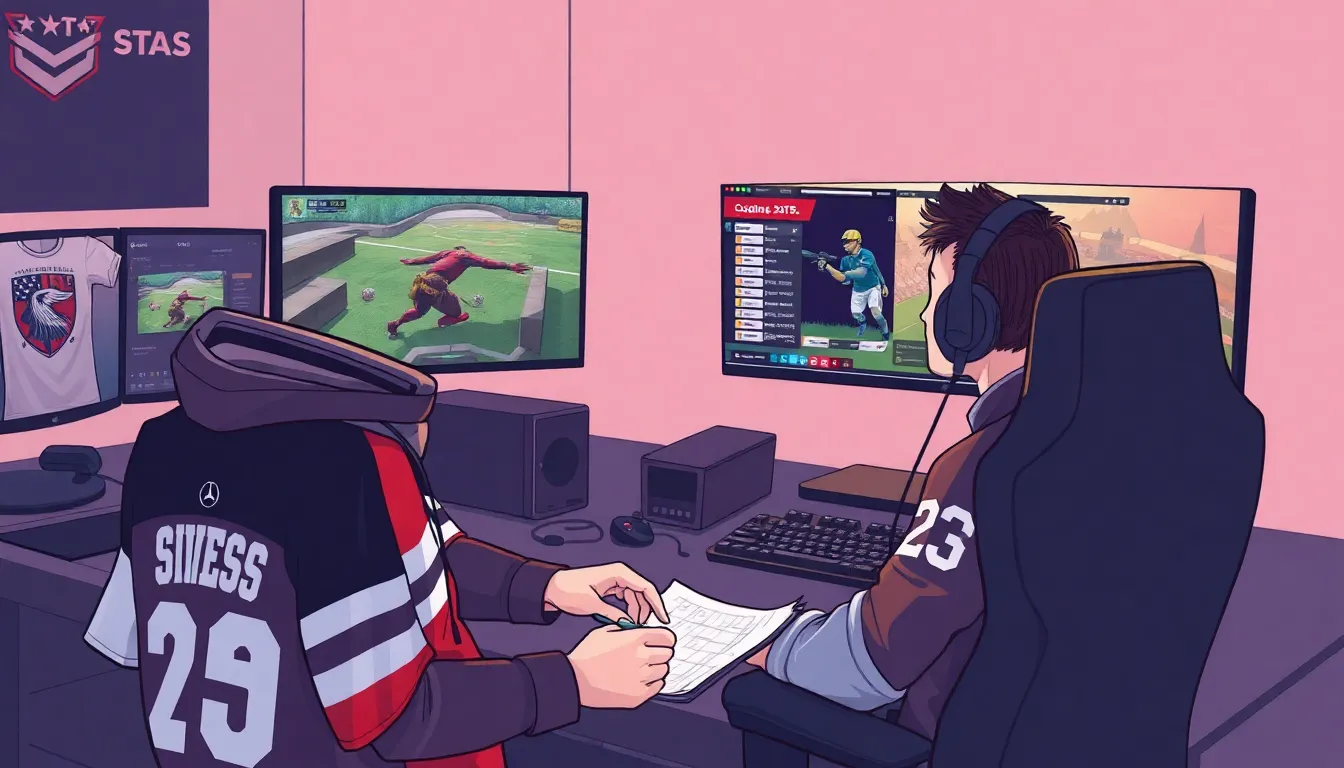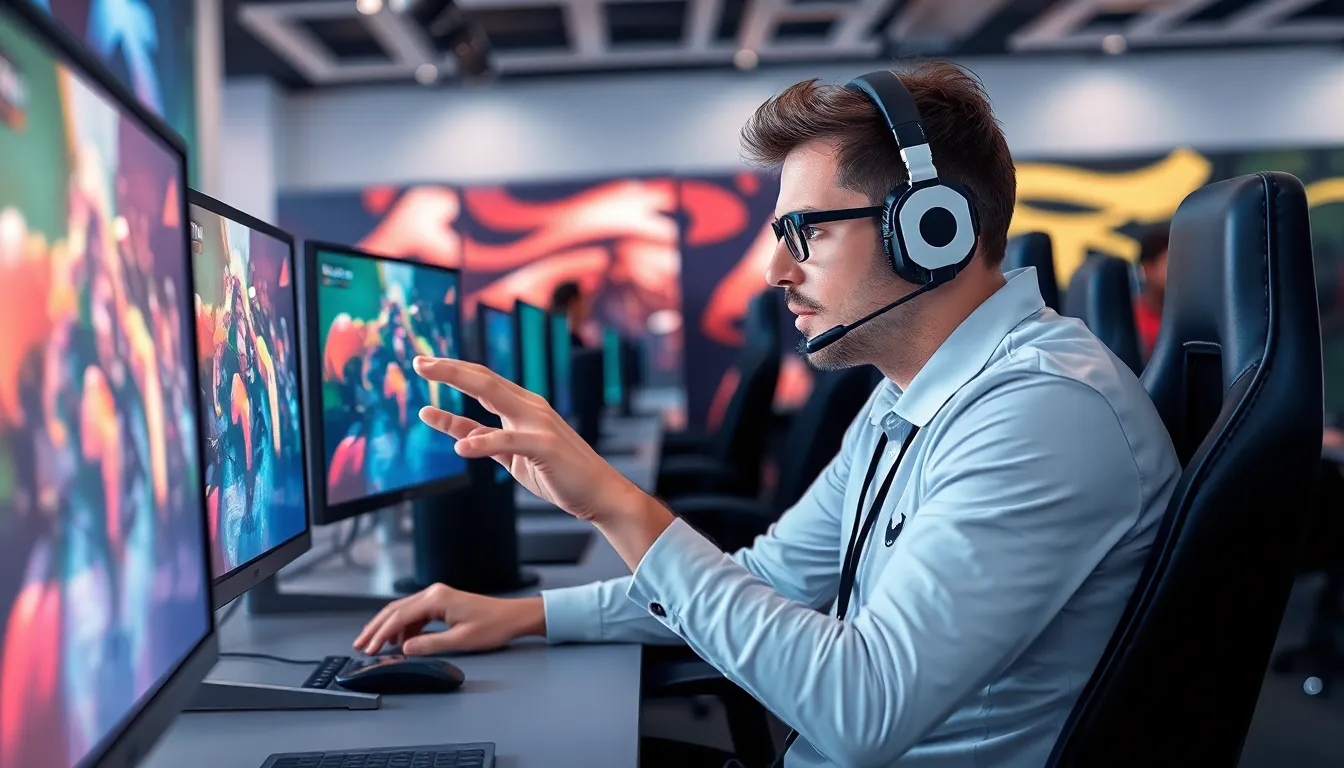Table of Contents
ToggleIn the fast-paced world of esports, players are racking up victories and streaming their way to fame faster than you can say “headshot.” But behind every champion lies a secret weapon: a skilled coach. Esports coaching isn’t just about shouting strategies through a headset; it’s about transforming raw talent into polished performance.
Understanding Esports Coaching
Esports coaching plays a pivotal role in enhancing performance and fostering player development. Coaches provide personalized guidance to help players unlock their full potential.
Definition of Esports Coaching
Esports coaching involves the systematic training and mentoring of players in competitive gaming environments. Coaches analyze gameplay, teach strategies, and evaluate performance metrics. They focus on individual strengths and weaknesses, tailoring their approach to meet each player’s specific needs. Coaches also encourage teamwork and communication, essential elements for success in multiplayer games. The goal is to develop skills that translate into higher levels of competition.
Importance of Esports Coaching
Coaching significantly influences a player’s journey in esports. Effective coaching enhances skill mastery, significantly improving game mechanics and strategic decision-making. Coaches foster mental resilience, helping players manage pressure during high-stakes matches. They provide consistent feedback, ensuring players can identify and correct mistakes. Additionally, coaching promotes discipline, establishing routines that contribute to overall performance. As the esports landscape evolves, having a knowledgeable coach has become a critical factor in achieving success.
Roles and Responsibilities of an Esports Coach

Esports coaches play a pivotal role in driving team success and enhancing individual player performance. They manage various aspects of team dynamics, player development, and overall strategy.
Team Management
Coaches oversee team logistics and ensure efficient operations during tournaments and practice sessions. They facilitate communication among team members to create a cohesive environment. Setting clear goals enhances team performance and accountability. Monitoring player interactions guides the development of teamwork skills essential for competitive play. Evaluating team dynamics enables coaches to address conflicts quickly and effectively. Encouraging regular feedback fosters a culture of openness and continuous improvement within the team.
Player Development
Focusing on skill enhancement, coaches tailor training programs to meet individual player needs. They analyze gameplay footage to identify strengths and weaknesses in performance. Regular one-on-one sessions provide players with personalized feedback and strategic advice. Establishing mental conditioning practices improves players’ focus and resilience. Coaches instill discipline and a strong work ethic, crucial traits for progress in esports. Creating a supportive environment encourages players to reach their full potential while building confidence in their abilities.
Essential Skills for Esports Coaches
Effective communication stands as a cornerstone in esports coaching. Coaches must convey strategies clearly, ensuring players understand game plans and individual roles. Active listening enhances this process, allowing coaches to gauge player concerns and adapt training methods accordingly. Furthermore, maintaining an open line for feedback fosters trust and camaraderie among team members. Coaches who master communication create a supportive atmosphere where players can thrive.
Game knowledge serves as another vital skill for coaches. A deep understanding of specific games enables them to teach strategies effectively. Coaches analyze gameplay mechanics and meta trends, offering insights that guide player decisions. They also emphasize the importance of adaptability, encouraging players to stay current with evolving game strategies. Coaches with robust game knowledge empower players to refine their skills, significantly impacting team performance.
Challenges in Esports Coaching
Esports coaching presents unique challenges that coaches must navigate to foster player growth and team success.
Addressing Team Dynamics
Building strong team dynamics is essential for effective collaboration. Coaches often face conflicting personalities and varying skill levels among players. Understanding individual temperament helps in managing conflicts and ensuring cohesive team interactions. Establishing clear communication channels facilitates trust and camaraderie, allowing players to express concerns openly. Regular team-building exercises can also strengthen relationships and promote a positive environment. Coaches must adapt their strategies to cater to these dynamics, ensuring that interaction styles are compatible and productive. Fostering an inclusive atmosphere allows players to work together seamlessly, enhancing overall team performance.
Managing Player Expectations
Meeting player expectations creates an additional challenge. Coaches encounter diverse aspirations ranging from casual improvement to competitive excellence. Balancing these varied goals requires clear, consistent communication about training objectives and individual roles. Transparency in discussions helps align expectations with realistic outcomes, reducing potential frustrations. Coaches must regularly assess player progress and provide feedback tailored to individual needs. Adjusting strategies based on performance data ensures that players remain engaged and motivated. Establishing achievable targets fosters a sense of accomplishment while pushing players toward excellence. Prioritizing mental resilience nurtures player adaptability in facing challenges, leading to long-term success in the competitive landscape.
The impact of esports coaching on player development and team success is undeniable. Coaches play a crucial role in shaping not just individual skills but also fostering a collaborative team environment. By tailoring training programs and providing personalized feedback, they empower players to reach their full potential.
As the esports landscape continues to evolve, the demand for knowledgeable and adaptable coaches will only grow. Their ability to navigate challenges and enhance team dynamics is essential for achieving lasting success. Investing in effective coaching is a strategic move for any aspiring esports organization aiming to thrive in this competitive arena.




